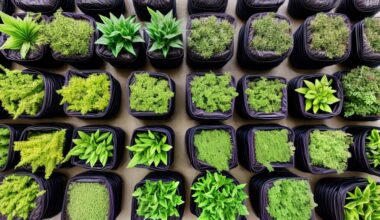If you’re a gardener, you know that weeds can be a persistent and frustrating problem. While there are many chemical weed killers available, they can be harmful to the environment and your health. That’s why many gardeners are turning to natural solutions like baking soda.
Baking soda is a household staple that is known for its many uses, from cleaning to cooking. But did you know that it can also be an effective weed killer? In this section, we’ll explore whether baking soda can provide a permanent solution for weed control in your garden.
Key Takeaways:
- Baking soda is a natural solution that can be effective in killing weeds.
- It is eco-friendly and can be a safer alternative to chemical weed killers.
- While it may not provide a permanent solution for weed control, baking soda can be used in conjunction with other methods for effective weed removal.
Understanding Baking Soda as a Weed Killer
If you’re looking for an eco-friendly and affordable way to control weeds in your garden, baking soda might be the solution you’re seeking. Baking soda, or sodium bicarbonate, works by disrupting the pH balance of the soil and drying out the leaves of the weeds. This makes it an effective natural herbicide that doesn’t harm the environment, animals, or humans.
One of the advantages of using baking soda as a weed killer is that it’s readily available in most households and grocery stores. It’s also easy to apply and doesn’t require any special equipment or training. You can simply mix baking soda with water and a small amount of dish soap to make a spray that you can apply directly to the weeds.
Baking soda also has other benefits as a weed control method. It can provide short-term relief by killing existing weeds, but it can also prevent future growth by altering the pH levels of the soil. This can make it difficult for weeds to establish root systems, ensuring that they don’t grow back as quickly or as strongly.
When using baking soda as a weed killer, it’s important to take precautions to ensure that you don’t damage other plants or contaminate the surrounding soil. One way to do this is to target the baking soda spray directly onto the leaves and stems of the weeds, avoiding any other nearby plants. You should also avoid using baking soda on windy days, as this can cause the spray to drift and affect unintended areas.
Overall, baking soda can be a great natural alternative to chemical weed killers. Its eco-friendly qualities and affordability make it an attractive option for many gardeners. However, it’s important to keep in mind that baking soda may not provide a permanent solution for weed control and may require regular maintenance and monitoring to ensure that weeds don’t regrow.
Other Effective Weed Control Methods
If you’re looking for long-lasting weed removal options to supplement the use of baking soda, there are several organic methods you can try. One such method is mulching, which involves covering the soil around your plants with a layer of organic matter such as leaves, grass clippings, or wood chips. This helps to prevent weed growth by blocking sunlight and suffocating any existing weeds.
Another effective and chemical-free option is hand-weeding. While this can be a time-consuming task, it can be very effective in removing weeds by their roots and preventing regrowth. Be sure to wear gloves to protect your hands and carefully remove the entire weed, including the roots.
For those who prefer chemical options, there are several long-lasting herbicides available that do not contain harmful chemicals. These herbicides work by targeting the root system of weeds, preventing regrowth for several months. Look for products with active ingredients such as corn gluten meal or iron-based compounds.
It’s important to note that while these methods can provide long-lasting weed control, they may not completely eliminate all types of weeds. Additionally, regular maintenance and monitoring of your garden is essential to prevent weed regrowth and maintain a healthy garden environment.

Incorporating a combination of these methods and regularly monitoring your garden can help to keep weeds under control without relying on harmful chemicals.
The Limitations of Baking Soda as a Permanent Weed Control Solution
While baking soda can be an effective weed control method, it may not provide a permanent solution for all types of weeds. Factors that can affect its effectiveness include soil pH, weather conditions, and the age and size of the weeds.
Baking soda is most effective as a weed killer on young weeds that are growing in areas with good soil drainage. It may not be as effective on mature, established weeds or weeds growing in areas with poor drainage.
Additionally, baking soda may not completely eradicate all types of weeds. It is primarily effective against annual weeds, which grow for one season and then die off, rather than perennial weeds, which grow back year after year.
It is important to note that even if baking soda does kill weeds in your garden, it does not prevent new weeds from growing. Without regular maintenance and monitoring, weed regrowth is likely to occur.
Therefore, while baking soda can be a helpful component of your weed control strategy, it is important to also consider other organic options, such as mulching and hand-weeding, to complement its use and provide long-lasting weed removal.

“Baking soda is most effective as a weed killer on young weeds that are growing in areas with good soil drainage.”
Conclusion
Congratulations! You have now learned about the effectiveness of baking soda as a weed killer and its limitations as a permanent solution. Before you start using baking soda as a natural weed control method, it is essential to understand its application methods and precautions.
Choosing the Most Suitable Weed Control Approach
While baking soda can be an effective weed control solution, it may not provide long-term results for all types of weeds. Therefore, it is essential to consider alternative weed control methods such as mulching, hand-weeding, or other chemical-free solutions that can complement the use of baking soda.
It is crucial to match the right strategy with the types of weeds you are dealing with and your preferences for eco-friendly solutions. Regular maintenance and monitoring are also essential to prevent weed regrowth.
By combining various weed control methods and regular maintenance, you can achieve a weed-free garden while minimizing the use of harmful chemicals.
Thank you for taking the time to read this article. We hope you found this information helpful in maintaining a beautiful and healthy garden.







